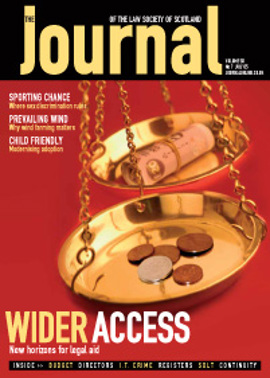Business sense

During the recent Westminster election campaign each of the main political parties in Scotland seemed to agree on at least one issue – if Scotland is going to become more competitive and as a result increase its growth rate, the cost and ease of doing business in Scotland needs to be addressed.
As part of this debate I propose that the cost and ease of buying, selling, assigning or leasing a property in Scotland should be closely examined, and in particular the interaction of SDLT and registration of title in Scotland. The critical importance of registration is not at present adequately taken into account.
These proposals have the potential to make the present system more efficient and reduce the cost to both the general public and the business community.
Combine the administration and collection functions of SDLT in Scotland with the Registers of Scotland
This would require the devolving of power for SDLT in Scotland to the Scottish Parliament. Potential benefits for both solicitors and the general public are:
- One-stop shop for title registration and payment of SDLT. The introduction of Automated Registration of Title to Land (“ARTL”) from spring 2007 (at least initially) is only going to be available for straightforward transactions. It is not yet clear if it will ever be available for more complicated transactions. Even under ARTL a letter of obligation will still be required as the registers will not be fully up to date and other searches may still be necessary, such as a company search.
- No need to visit two separate offices if same day registration is required.
- No need to make separate payments for registration and SDLT.
- Ending of different opening hours and holidays. At present the two offices follow different public holiday dates.
- Possible scope to reduce the length of time covered by the letter of obligation back to the pre-SDLT 14 days or even less. As a result there will be less risk to the solicitor. The Law Society of Scotland may also be able to negotiate a lower premium on its indemnity policy.
- Possible cost savings due to sharing of facilities.
- As part of the plan to relocate civil service jobs, consider opening new combined offices throughout Scotland.
- The devolving of power would allow the Scottish Parliament to develop SDLT so that it meets the needs of both the Scottish legal and business communities. This could include having different SDLT bands to take account of the lower level of property prices in Scotland from that of England.
Alternatively the Edinburgh Stamp Office to share the same offices as the Registers of Scotland
- No need to devolve power to the Scottish Parliament.
- By simply having the two offices under the same roof this should again ensure a time saving if same day registration is required.
- Develop a system where a single payment for both registration and SDLT can be made for all property transactions. In effect this would simply mean progressing the plan for the Registers to become the collector of SDLT in Scotland.
- Look at ways to integrate these two services, for example opening hours and holidays.
- Possible cost savings due to sharing of facilities.
Other suggested changes to improve the present system
Even if there is resistance to either combining these two offices or to having them located in the same building, the following changes could greatly improve the present system:
- Edinburgh Stamp Office to deal with all Scottish property matters. This would mean that each SDLT form relating to a Scottish land transaction should be sent to the Edinburgh Stamp Office. A Scottish SDLT helpline and Complex Transactions Unit should also be set up and based at the Edinburgh Stamp Office. This would ensure that Scottish matters are dealt with by people that have a knowledge and understanding of Scottish property law. A further advantage would hopefully be that any advice given would be of better quality and consistency. It is also likely that if Scotland had its own SDLT Complex Transactions Unit, this could deal with requests for guidance quicker than is at present the case.
- Even if it is decided to set up a specific Scottish Complex Transactions Unit, the Stamp Taxes Office needs to put more resources into this area immediately to ensure a much quicker turnaround time.
- Separate Scottish SDLT forms and guidance notes. This would lead to a reduction in length of both the forms and the notes as there will be no need to include the Scottish sections in the English forms and vice versa.
- Personal presentment made available for all Scottish land transactions.
- Speed up introduction of online registration and payment of SDLT.
- Consider reducing the cost of registration of title to at least the level set in England. The registration fee for a property valued at £100,000 in England is £100, in Scotland £200. At a value of £5,000,000 the fee in England is £700, in Scotland £7,500. If the cost is too high to introduce the reduction overnight, it could be brought in over a number of years. If, however, there is resistance to reducing registration fees in Scotland, any reason justifying the higher fees should be openly debated.
James Aitken, Tax Associate, Bell & Scott LLP
In this issue
- Commissioner: Public Authorities must do more
- Supporting legal aid
- No country cousins
- Making the money go further
- Adopting a new approach
- Gordon giveth and Gordon taketh away
- A blow for the future
- A Wie hint of change?
- Raising the bar
- The IT crimewave
- The directing mind
- Going through the motions
- Planning in the park
- Always look on the bright side
- Scottish Solicitors' Discipline Tribunal
- Website reviews
- Book reviews
- The race to the registers revisited
- SDLT: getting it right
- SDLT: barcoding
- Business sense






